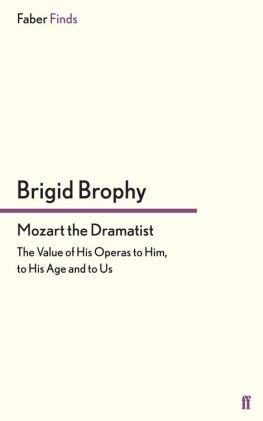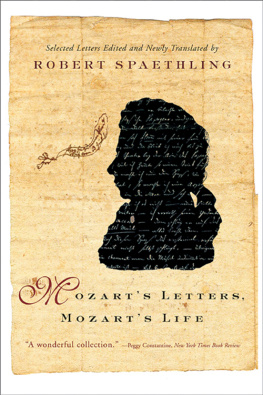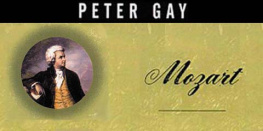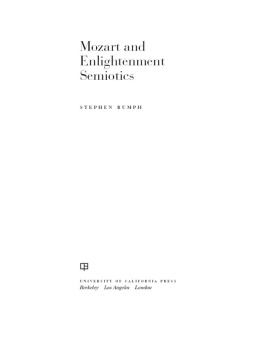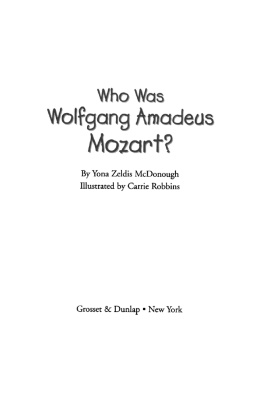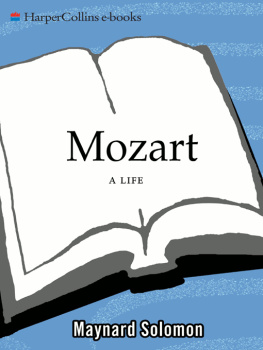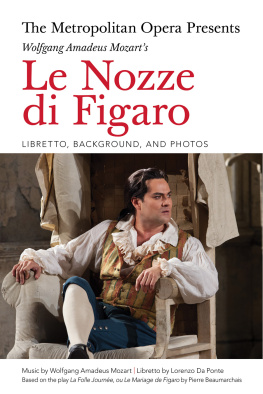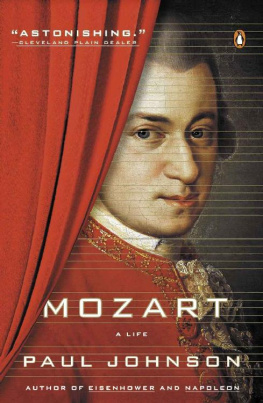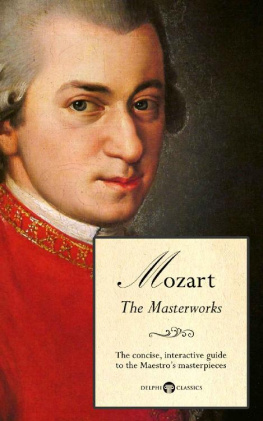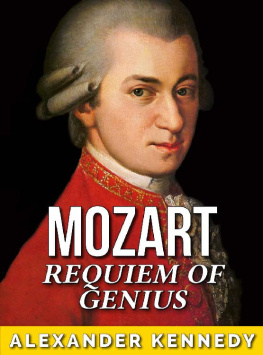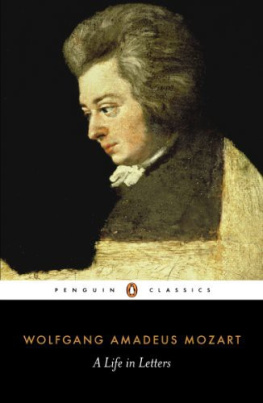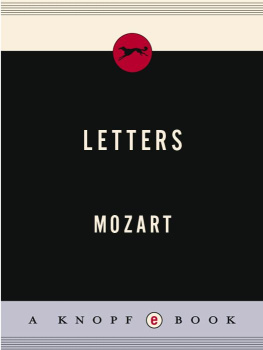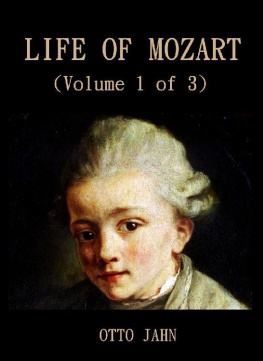
To
R OSEMARY AND C HRISTOPHER W HITE
who initiated us into
Glyndebourne
On the contrary they adorewe all adore herethe rococo
HENRY JAMES: THE AMBASSADORS
A new world of love and beauty broke upon her when she was introduced to those divine compositions : this lady had the keenest and finest sensibility , and how could she be indifferent when she heard Mozart? The tender parts of Don Juan awakened in her raptures so exquisite that she would ask herself when she went to say her prayers of a night whether it was not wicked to feel so much delight as that with which Vedrai Carino and Batti Batti filled her gentle little bosom.
W. M. THACKERAY: VANITY FAIR
Contents
Two extracts from this book have appeared in TheLondonMagazine.
The notes which are collected at the back of the book supply dates, sources, often the original wording of a quotation (when the text has given a translation) and occasionally additional information . Notes essential to the text are placed on the pages. I am grateful to the Executors of the late Emily Anderson, and her publishers, Messrs. Macmillan & Co., for permission to use throughout my book her translation of Mozarts and his familys Letters (London, 1938) references to the scores of the operas are to English editions: details of these and all the other books referred to are to be found at the end in the List of Articles and Books Cited. I take much pleasure in thanking Mrs David Wood for help about musical theory, and Mr R. Newland for help about German.
B RIGID B ROPHY
(Dates for the operas are of first performances)
| 1756 | Johann (Pertl) Mozart |
| 1775 | IlRePastore, K. 208 |
| 1778 | death of Mozarts mother |
| 1781 | Idomeneo, K. 366 |
| 1782 | DieEntfhrungausdemSerail (IlSeraglio), K. 384 Mozarts marriage to Constanze Weber |
| 1784 | Mozart became a Mason |
| 1785 | Leopold Mozart became a Mason |
| 1786 | LeNozzediFigaro, K. 492 |
| 1787 | death of Mozarts father DonGiovanni, K. 527 |
| 1788 | Symphonies K. 543, 550, 551 |
| 1790 | CosFanTutte, K. 588 |
| 1791 | LaClemenzadiTito, K. 621
DieZauberflte, K. 620
Requiem, K. 626 (finished by Sssmayr)
Mozart died on 5 December |
See Alfred Einstein: MozartHisCharacterHisWork, 3, footnote.
Maria Anna according to Emily Anderson; Anna Maria according to Einstein.
In this new edition of a book originally published in 1964 I have expanded and amended several passages. I have made reference to books published after 1964, some of which I reviewed in periodicals. A tolerably detailed note about one such book appears at the back of this volume. When I want to mention DieEntfhrungausdemSerail by a shorter title, I call it IlSeraglio. That I have not altered, because it is correct. In English-speaking countries IlSeraglio is the title of countless performances and of the standard British vocal score. I do not know why an opera composed to sung and spoken words in German was given an English title consisting of two words of Italian, especially when to call it The Seraglio would accord with eighteenth-century English idiom and with present-day comprehension.
Were I now writing a book about Mozart and his operas, my design would incorporate a section in praise of Idomeneo and LaClemenzadiTito. In 1964 I knew both operas to be musical masterpieces, but at that time it was rare for a performance, even in the theatre, to allow the music to point up the drama. The drama had probably been frightened into hiding by musicologists , who put it about that anything couched in the form of operaseria (in Italian, with sung recitative and with a plot taken from the mythology or the history of ancient Greece or Rome) was unfeeling. From that notion, which is as senseless and as destructive of delight as it would be to write of Shakespeares tragedies as unfeeling in comparison with his comedies or the other way about, audiences have now been rescued by performers , notably Charles Mackerras, who have moved them to joy and tears by placing before them the masterpieces in the operaseria form which Handel created towards the beginning and Mozart towards the end of the eighteenth century.
Mozart was commissioned in autumn 1780 to compose an opera for the carnival season at Munich. The Bavarian court, besides appointing as librettist Giambattista Varesco, Mozarts fellow-resident of Salzburg and fellow-employee of the ecclesiastical court, chose the subject of Idomeneus. His story is one of those about the return of the Greek heroes from the Trojan War. King of Crete, Idomeneus is on the voyage home when his ship is beset by a storm. He vows that, should he succeed in setting foot on land, he will sacrifice the first living entity he sees. The vow saves his life but impales him on a moral dilemma. The first live being he sees turns out to be his son, grown up while his father was away at the long, indeed the Homeric war. Cast safe on the coast of Crete, out of the sea, he sings in Mozarts opera; he has a sea in his breast.
Whether Idomeneus is more obliged to fulfil his oath, for his tardiness in discharging which he is magically and monstrously punished, though most of the actual affliction falls on the population of Crete, than he is obliged to love his son is a dilemma of the type by which ancient Greek tragedy regularly splits its heroes and heroines. Greek mythology is uncertain whether Idomeneus kills his son or only tries to, but his action or attempt revolts the people of Crete and they expel him from his kingdom. Fitting though the theme was for ancient Greek tragedy, no surviving Greek tragedy, so far as I know, took it up. It was left to eighteenth-century opera. It was treated in French in an opera I do not know, Idomene, by Andr Campra, performed in 1712. Varesco may have borrowed from that his softened but dramatically cogent ending, where the dilemma is resolved not by the sacrifice of the son but by the voluntary quasi-sacrifice of the father, who abdicates his throne in his sons favour.
Late in the autumn of 1780 Mozart went to stay, alone, in Munich in order to compose the bulk of his opera in acquaintance with the orchestra and the singers who were to perform it. Leopold Mozart and the librettist were tethered, by their employment at the ecclesiastical court there, in Salzburg. Mozart wanted Varesco to alter the text, chiefly by cutting it, into accordance with Mozarts sense of drama and the abilities and disabilities he perceived in the singers. The negotiation was conducted by letter. Mozart wrote to his father and his father negotiated with Varesco. Mozarts letters bridging the turn of the year (1780 to 1781) are a casement opening uniquely on not only his dramatic method but the crucial relationship of his life. Mozart conducts a double negotiation: by argument and by tellingly applying the lessons taught him, he persuades his father, his earliest tutor in music, drama and worldly wisdom, to persuade Varesco.

